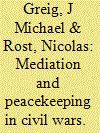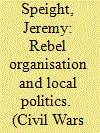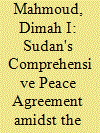|
|
|
Sort Order |
|
|
|
Items / Page
|
|
|
|
|
|
|
| Srl | Item |
| 1 |
ID:
122765


|
|
|
|
|
| Publication |
2013.
|
| Summary/Abstract |
As pointed out by Roeder and Rothchild (P. G. Roeder and D. Rothchild (eds), Sustainable Peace: Power and Democracy after Civil Wars (New York: Cornell University Press 2005)), a crucial dilemma in post-war power-sharing arrangements is that the very same institutions that provide an attractive basis for ending a conflict are likely to hinder the consolidation of peace and democracy in the long term. The 2005 Comprehensive Peace Agreement (CPA) was the major reason for ending Sudan's North-South civil war - for 'winning the war' - but did also create the conditions for 'losing the peace'? This article looks at the power-sharing arrangements of the CPA and its impact on the conditions from peace and democracy in Sudan in the interim period prior to the referendum on southern independence. Through analyses of its formal institutional frames, its implementation, and the major stakeholders' perceptions, it becomes clear that the power sharing did not 'make unity attractive', as initially anticipated, but was in fact one of the factors contributing to the separation of Sudan in 2011.
|
|
|
|
|
|
|
|
|
|
|
|
|
|
|
|
| 2 |
ID:
122766


|
|
|
|
|
| Publication |
2013.
|
| Summary/Abstract |
The occurrence of outside mediation and peacekeeping has increased exponentially since the end of the Cold War. But how do third-party states and international organizations decide which civil wars to intervene in? And how do they decide whether to mediate talks between the warring parties or to send peacekeepers? In this study, we propose that third parties are influenced by their interests in a civil war country, they take into account the urgency a civil war poses, and they shy away from particularly challenging civil wars. Empirical tests confirm some of these hypotheses but also yield some contrary results. In contrast to much of the empirical literature, which has mostly treated different conflict management tools separately, this study combines two of the most important aspects of international conflict management - mediation and peacekeeping - into one theoretical framework.
|
|
|
|
|
|
|
|
|
|
|
|
|
|
|
|
| 3 |
ID:
122763


|
|
|
|
|
| Publication |
2013.
|
| Summary/Abstract |
Examining the experiences of the South since Sudan's independence, this article analyses why the choice of 'unity' became an unrealistic option for South Sudanese. Stressing that self-determination for the South was the only way to resolve Sudan's long-standing national crisis, this article points out, at the same time, that it left unresolved the issue of self-determination for the peoples of the northern Sudan who joined the Sudan People's Liberation Movement/Army and brought new problems, particularly to the newly created international border area between Sudan and South Sudan.
|
|
|
|
|
|
|
|
|
|
|
|
|
|
|
|
| 4 |
ID:
122767


|
|
|
|
|
| Publication |
2013.
|
| Summary/Abstract |
Scholars have begun to show how variations in the organization of rebellion in war can impact outcomes related to the violence used against civilians, military effectiveness of armed groups and the post-conflict transitions. This article suggests that existing approaches in this literature overlook sub-group variations in relationships between national-level leaders of armed movements and local commanders. Exogenous factors that explain organizational variation and organizational effects are generally argued to be group wide. By focusing on the local level, I argue that many of the presumed downstream effects of variation in rebel organization can also contribute to the organizational choices leaders make for controlling local actors. This article demonstrates this argument through the case of Bouna in north-eastern Côte d'Ivoire, where a tax revolt against the local Forces Nouvelles (FN) administration, led by local Lobi youth, forced a restructuring in the relationship between Soro and the local FN commander, Morou Ouattara.
|
|
|
|
|
|
|
|
|
|
|
|
|
|
|
|
| 5 |
ID:
122762


|
|
|
|
|
| Publication |
2013.
|
| Summary/Abstract |
Following the secession of South Sudan, Northern Sudan finds itself at a crossroads. Governed since 1989 by the Al-Ingaz regime, Khartoum's political elites are under pressure from the international community and the ordinary Sudanese people to democratise and ditch the autocratic Islamism that has been their hallmark for decades. Omar Al-Bashir and Ali Osman Taha face fierce criticism for presiding over the break-up of Africa's biggest country. Simultaneously, key constituencies in the security services and business community are signalling discontent too, lobbying instead for a further centralisation and the abandonment of the grudging liberalisation that started after Hassan Al-Turabi's removal from power in 1999-2000. Based on interviews with key movement and party members, this article assesses to what extent the Comprehensive Peace Agreement has changed the National Congress Party (NCP) and the Harakat Al-Islamiyya. It examines the internal dynamics within Khartoum's power bloc and argues that the current regime has in many ways become, 'Al-Ingaz without its Islamic soul', dixit one senior Islamist. Despite Bashir's controversial speech in Gedarif in December 2010, during which he called for Sharia and an end to multiculturalism in Northern Sudan, NCP ideologues are eyeing a strategic redeployment of political capital and economic investment, seeking to become an ordinary hegemonic party.
|
|
|
|
|
|
|
|
|
|
|
|
|
|
|
|
| 6 |
ID:
122761


|
|
|
|
|
| Publication |
2013.
|
| Summary/Abstract |
This special section examines the Comprehensive Peace Agreement (CPA) between the Government of the Republic of the Sudan and the Sudan People's Liberation Movement/Army. It focuses on why the agreement was possible, the challenges involved in reaching and implementing it, and the issues that now lay ahead for both North and South Sudan. The purpose of this undertaking is to tease out what lessons might be learnt from this case for the future study and practice of seeking to settle civil wars through agreement and implementation of conflict settlements. This introductory article first provides a brief summary of the Sudanese civil war; it then examines the CPA's power and wealth-sharing arrangements and their implementation to date; and finally concludes with an analysis of statebuilding in the recently independent South Sudan.
|
|
|
|
|
|
|
|
|
|
|
|
|
|
|
|
| 7 |
ID:
122764


|
|
|
|
|
| Publication |
2013.
|
| Summary/Abstract |
The euphoria of celebrating South Sudan's independence and the completion of the Comprehensive Peace Agreement, signed in 2005, must not undermine the significance of assessing and more importantly acknowledging the shortcomings of securing Sudan's stability and unity as a result of its exclusive nature. By all means, the responsibility was primarily that of the government of Sudan to ensure the country's territorial integrity. However, the regional and international mediators are not free of blame. By analysing the objectives and outcomes of the peace process, while considering the conflicting agendas of all involved parties, this article underlines the failures that led to Sudan's secession and left the country with yet another conflict: Darfur.
|
|
|
|
|
|
|
|
|
|
|
|
|
|
|
|
|
|
|
|
|